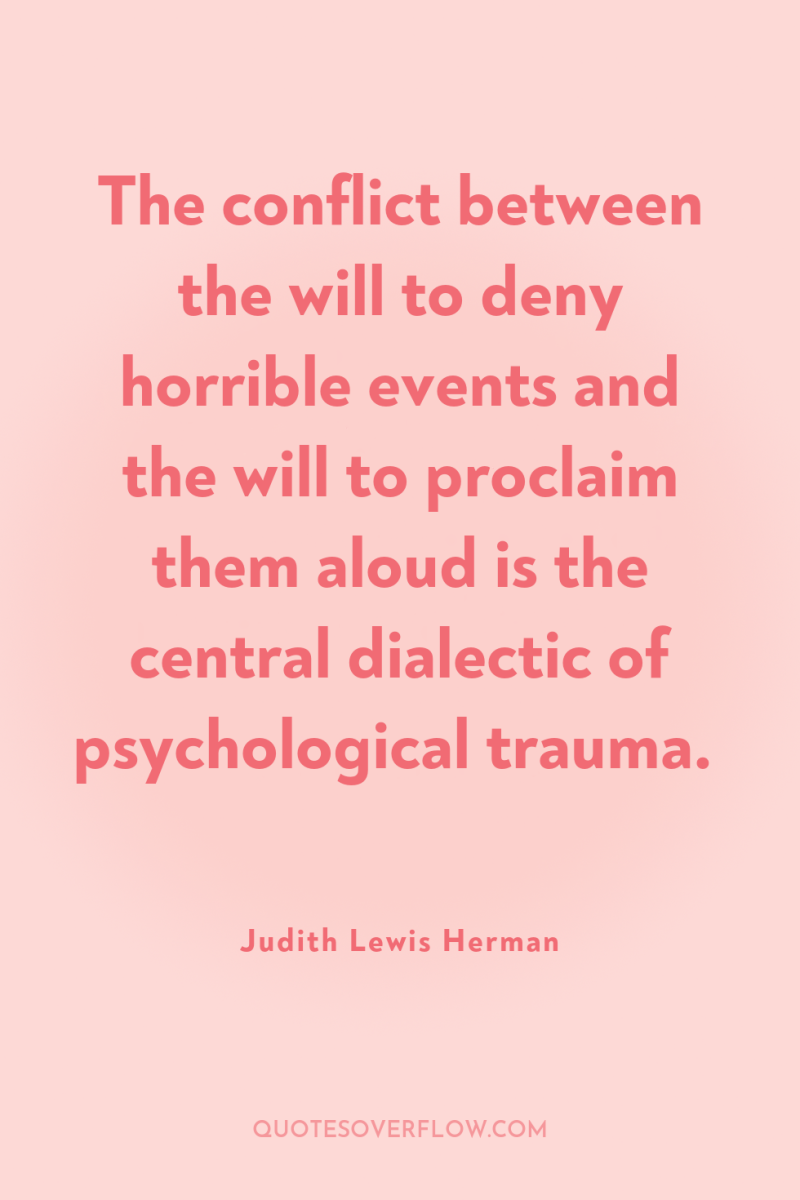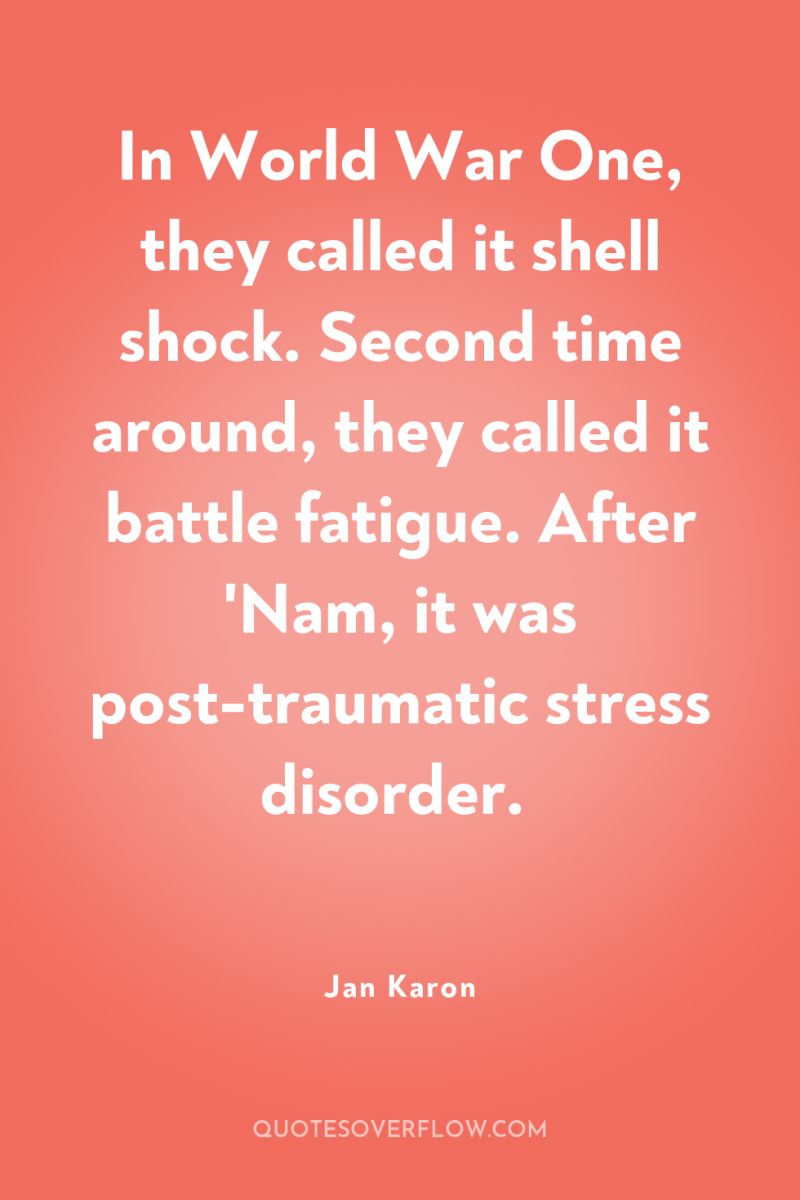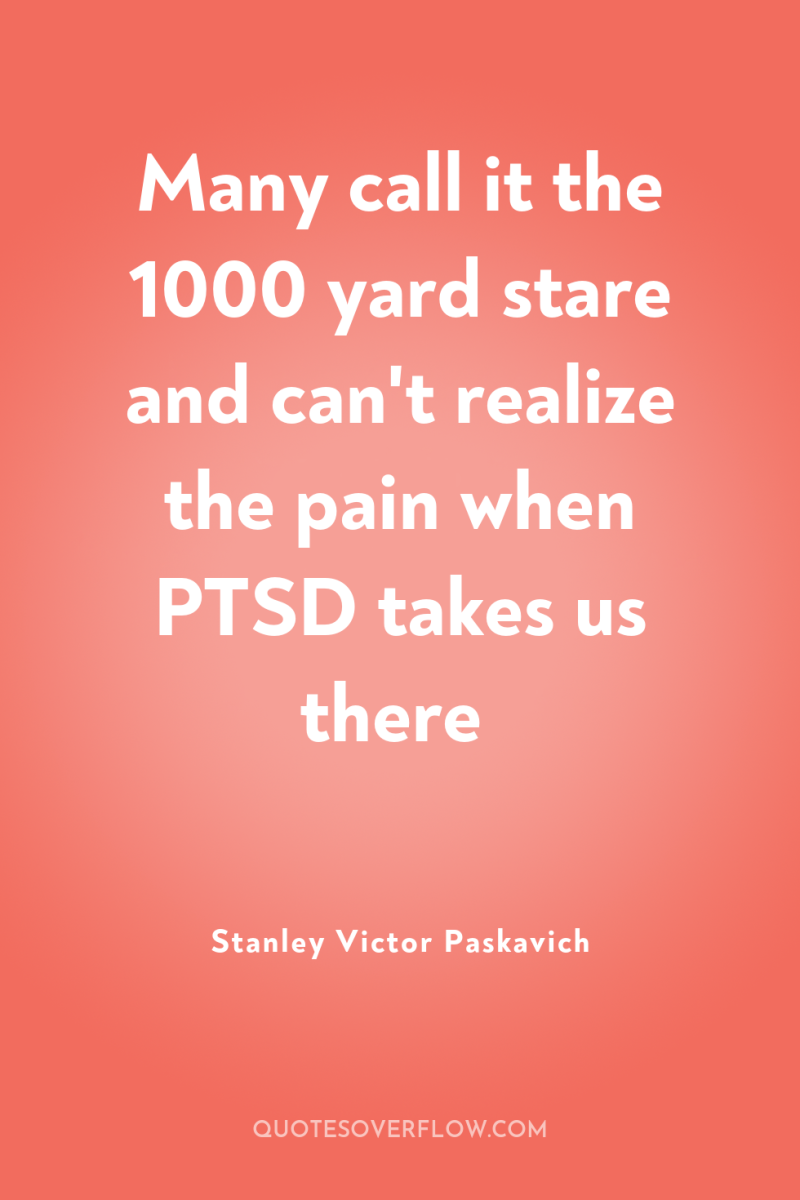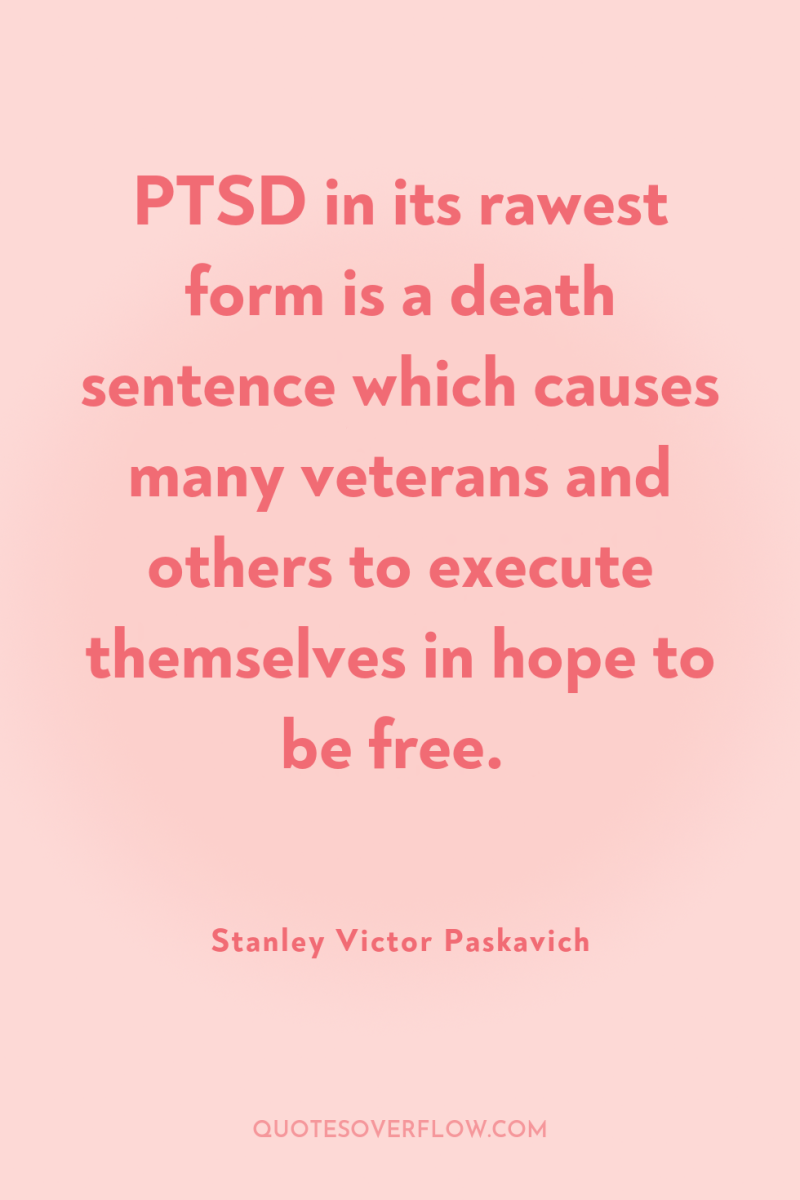
1
The conflict between the will to deny horrible events and the will to proclaim them aloud is the central dialectic of psychological trauma.Judith Lewis Herman
2
PTSD is a whole-body tragedy, an integral human event of enormous proportions with massive repercussions.Susan Pease Banitt

3
In World War One, they called it shell shock. Second time around, they called it battle fatigue. After 'Nam, it was post-traumatic stress disorder.Jan Karon
4
Impending war was evidenced by the faraway expression in the older villagers' eyes, the shadows on their faces, not of fear but of sorrow. Because they knew; they had lived through the last war and they remembered the generation of young men who had marched off so willingly and never come back. Those too, like Daddy, who had made it home, but left in France a part of themselves that they could never recover. Who surrendered to moments, periodically, in which their eyes filmed and their lips whitened, and their minds gave over to sights and sounds they wouldn't share but couldn't shake. .Kate Morton

5
Many call it the 1000 yard stare and can't realize the pain when PTSD takes us thereStanley Victor Paskavich

6
PTSD in its rawest form is a death sentence which causes many veterans and others to execute themselves in hope to be free.Stanley Victor Paskavich
8
When he first said my diagnosis, I couldn't believe it. There must be another PTSD than post-traumatic stress disorder, I thought. I have only heard of war veterans who have served on the front lines and seen the horrors of battle being diagnosed with PTSD. I am a Beverly Hills housewife, not a soldier. I can't have PTSD. Well, I was wrong. Housewives can get PTSD, too, and yours, truly did.Taylor Armstrong
9
Admitting the need for help may also compound the survivor's sense of defeat. The therapists Inger Agger and Soren Jensen, who work with political refugees, describe the case of K, a torture survivor with severe post-traumatic symptoms who adamantly insisted that he had no psychological problems: "K..did not understand why he was to talk with a therapist. His problems were medical: the reason why he did not sleep at night was due to the pain in his legs and feet. He was asked by the therapist..about his political background, and K told him that he was a Marxist and that he had read about Freud and he did not believe in any of that stuff: how could his pain go away by talking to a therapist?.Judith Lewis Herman
10
The most common emotional defense is avoidance (an ineffective coping skill for any stressor) as expressed through denial (e.g., "That wasn't really bad, I barely remember it").Brian Luke Seaward
11
P.T.S.D. doesn't make you weak. It makes you a survivor.DaShanne Stokes
12
..repeated trauma in childhood forms and deforms the personality. The child trapped in an abusive environment is faced with formidable tasks of adaptation. She must find a way to preserve a sense of trust in people who are untrustworthy, safety in a situation that is unsafe, control in a situation that is terrifyingly unpredictable, power in a situation of helplessness. Unable to care for or protect herself, she must compensate for the failures of adult care and protection with the only means at her disposal, an immature system of psychological defenses. .Judith Lewis Herman
13
Dissociation is the common response of children to repetitive, overwhelming trauma and holds the untenable knowledge out of awareness. The losses and the emotions engendered by the assaults on soul and body cannot, however be held indefinitely. In the absence of effective restorative experiences, the reactions to trauma will find expression. As the child gets older, he will turn the rage in upon himself or act it out on others, else it all will turn into madness. .Judith Spencer
14
The brave men and women, who serve their country and as a result, live constantly with the war inside them, exist in a world of chaos. But the turmoil they experience isn’t who they are; the PTSD invades their minds and bodies.Robert Koger
15
Trauma is hell on earth. Trauma resolved is a gift from the gods.Peter A. Levine
16
First, the physiological symptoms of post-traumatic stress disorder have been brought within manageable limits. Second, the person is able to bear the feelings associated with traumatic memories. Third, the person has authority over her memories; she can elect both to remember the trauma and to put memory aside. Fourth, the memory of the traumatic event is a coherent narrative, linked with feeling. Fifth, the person's damaged self-esteem has been restored. Sixth, the person's important relationships have been reestablished. Seventh and finally, the person has reconstructed a coherent system of meaning and belief that encompasses the story of trauma. .Judith Lewis Herman
17
She's terrified that all these sensations and images are coming out of her – but I think she's even more terrified to find out why." Carla's description was typical of survivors of chronic childhood abuse. Almost always, they deny or minimize the abusive memories. They have to: it's too painful to believe that their parents would do such a thing.David L. Calof
18
...some patients resist the diagnosis of a post-traumatic disorder. They may feel stigmatized by any psychiatric diagnosis or wish to deny their condition out of a sense of pride. Some people feel that acknowledging psychological harm grants a moral victory to the perpetrator, in a way that acknowledging physical harm does not.Judith Lewis Herman
19
I had built such a wall between my experiences and how I felt about those experiences that I was incapable of reliving both simultaneously. I could talk about my traumas, even walk through them, but I couldn’t feel them. When I tried to bring it all together, when I tried to remember how I had felt, I disappeared in my own head. My to-do list took on grave importance. The book I read the night before filled my thoughts. Yesterday’s article suddenly called out to be rewritten. I couldn’t get inside myself. .Sarah Hackley
20
The unrelenting grip of Soldier’s Syndrome slips finger by slow finger. The marrow’s been affected–emotional leukemia at the deepest level. Transplants of love and friendship aid healing, yet time is still key, and the clock never ticks fast enough. Eternity gains perspective when seconds feel like years. How long have I been gone? Six eternities and counting.Chila Woychik
21
Often it isn’t the initiating trauma that creates seemingly insurmountable pain, but the lack of support after.S. Kelley Harrell
22
I am Frustration. I am Memory-Lost. Sometimes I read a line a dozen times before it sticks. My creative force has slipped. I type slower, speak slower, think at a snail’s pace. I’m Life shapeshifted by Post Traumatic Stress, bastardized by Fate.Chila Woychik
23
Many veterans feel guilty because they lived while others died. Some feel ashamed because they didn’t bring all their men home and wonder what they could have done differently to save them. When they get home they wonder if there’s something wrong with them because they find war repugnant but also thrilling. They hate it and miss it. Many of their self-judgments go to extremes. A comrade died because he stepped on an improvised explosive device and his commander feels unrelenting guilt because he didn’t go down a different street. Insurgents used women and children as shields, and soldiers and Marines feel a totalistic black stain on themselves because of an innocent child’s face, killed in the firefight. The self-condemnation can be crippling. The Moral Injury, New York Times. Feb 17, 2015.David Brooks
24
The victims of PTSD often feel morally tainted by their experiences, unable to recover confidence in their own goodness, trapped in a sort of spiritual solitary confinement, looking back at the rest of the world from beyond the barrier of what happened. They find themselves unable to communicate their condition to those who remained at home, resenting civilians for their blind innocence. The Moral Injury, New York Times. Feb 17, 2015.David Brooks
25
People generally don’t suffer high rates of PTSD after natural disasters. Instead, people suffer from PTSD after moral atrocities. Soldiers who’ve endured the depraved world of combat experience their own symptoms. Trauma is an expulsive cataclysm of the soul. The Moral Injury, New York Times. Feb 17, 2015David Brooks
26
In 2011, actor Johnny Depp told the November issue of Vanity Fair that he felt participating in a photoshoot was akin to rape." Well, you just feel like you're being raped somehow. Raped . It feels like a kind of weird - just weird, man. But whenever you have a photo shoot or something like that, it's like - you just feel dumb. It's just so stupid, " he said. Likening instances of being flustered or uneasy to the often life-shattering experience of rape has become a far too common comparison in modern lexicon. The phrase "Facebook rape" is perhaps the most widely used, which implies one person has posted on another person's Facebook account - usually something intended to embarrass the person. But the casual, flippant use of the term "rape" in instances that do not involve sexual violence is highly problematic in that it trivialises one of the most despicable invasions of a human being. Desensitising the masses to the term "rape" is just another way the conversation surrounding sexual assault is derailed or diluted in society. Rape is, and should be considered universally, as a serious societal sickness that occurs within the "toxic silence" that surrounds sexual assault as Tara Moss put so elegantly in her recent Q&A appearance. Further to that, the use of the term can be a trigger for rape survivors in that it may jolt terrifying memories of their own experience. According to the Australian Institute of Family Studies, up to 57 per cent of rape survivors suffer post-traumatic stress disorder in their lifetime, with "triggers" including inflammatory words like rape causing deeply traumatic recollections. Beware desensitising the term "rape", Newcastle Herald, June 6, 2014 .Emma Elsworth
27
Dissociation can enable us to withstand pain and loss under which we would otherwise break. It enables us to survive and pull through. But, a habit of continual dissociation — especially after the trauma has passed — leads to the shut-in feeling I was experiencing. While I imagined I was being strong in the face of pain, in reality, I was merely hiding.Sarah Hackley
28
Some of the experiences endured by human beings on this earth are virtually unbelievable.Aphrodite Matsakis
29
Treating Abuse Today (Tat), 3(4), pp. 26-33Freyd: I see what you're saying but people in psychology don't have a uniform agreement on this issue of the depth of -- I guess the term that was used at the conference was -- "robust repression." T A T: Well, Pamela, there's a whole lot of evidence that people dissociate traumatic things. What's interesting to me is how the concept of "dissociation" is side-stepped in favor of "repression." I don't think it's as much about repression as it is about traumatic amnesia and dissociation. That has been documented in a variety of trauma survivors. Army psychiatrists in the Second World War, for instance, documented that following battles, many soldiers had amnesia for the battles. Often, the memories wouldn't break through until much later when they were in psychotherapy. Freyd: But I think I mentioned Dr. Loren Pankratz. He is a psychologist who was studying veterans for post-traumatic stress in a Veterans Administration Hospital in Portland. They found some people who were admitted to Veteran's hospitals for postrraumatic stress in Vietnam who didn't serve in Vietnam. They found at least one patient who was being treated who wasn't even a veteran. Without external validation, we just can't know --TAT: -- Well, we have external validation in some of our cases. Freyd: In this field you're going to find people who have all levels of belief, understanding, experience with the area of repression. As I said before it's not an area in which there's any kind of uniform agreement in the field. The full notion of repression has a meaning within a psychoanalytic framework and it's got a meaning to people in everyday use and everyday language. What there is evidence for is that any kind of memory is reconstructed and reinterpreted. It has not been shown to be anything else. Memories are reconstructed and reinterpreted from fragments. Some memories are true and some memories are confabulated and some are downright false. T A T: It is certainly possible for in offender to dissociate a memory. It's possible that some of the people who call you could have done or witnessed some of the things they've been accused of -- maybe in an alcoholic black-out or in a dissociative state -- and truly not remember. I think that's very possible. Freyd: I would say that virtually anything is possible. But when the stories include murdering babies and breeding babies and some of the rather bizarre things that come up, it's mighty puzzling. T A T: I've treated adults with dissociative disorders who were both victimized and victimizers. I've seen previously repressed memories of my clients' earlier sexual offenses coming back to them in therapy. You guys seem to be saying, be skeptical if the person claims to have forgotten previously, especially if it is about something horrible. Should we be equally skeptical if someone says "I'm remembering that I perpetrated and I didn't remember before. It's been repressed for years and now it's surfacing because of therapy." I ask you, should we have the same degree of skepticism for this type of delayed-memory that you have for the other kind? Freyd: Does that happen? T A T: Oh, yes. A lot.David L. Calof
30
In talking with people that have experienced it, I learned that PTSD is something that a person in a position of authority sometimes thinks they’re not supposed to have. They don’t always have an avenue to personally address it or even discuss it.Stana Katic
31
Trauma destroys the fabric of time. In normal time you move from one moment to the next, sunrise to sunset, birth to death. After trauma, you may move in circles, find yourself being sucked backwards into an eddy or bouncing like a rubber ball from now to then to back again.. In the traumatic universe the basic laws of matter are suspended: ceiling fans can be helicopters, car exhaust can be mustard gas. .David J. Morris
32
Denial and minimizing is often seen in genuine PTSD and, hence, should be a target of detection and measurement.Harold V. Hall
33
The central mechanism of the avoidance mechanism of PTSD is the ego defense of denialFrank M. Ochberg
34
There is clear evidence from internal investigations in the past that some raters actually see themselves as adversaries to veterans. If a claim can be minimized, then the government has saved money, regardless of the need of the veteran. Just recently, the press exposed an official e-mail from a high-level staff person who stated in essence that PTSD diagnosis was becoming too prevalent and offered ways to delay and deflect ratings in order to save the government money.Taylor Armstrong
35
The unique stigma of PTSD. The stigma of PTSD remains one of the most formidable barriers to effective care.Michael A. Cucciare
36
Always remember, if you have been diagnosed with PTSD, it is not a sign of weakness; rather, it is proof of your strength, because you have survived!Michelle Templet
37
Ninety-six per cent of juvenile prostitutes are fugitives from abusive domestic situations; 66 per cent began working before they turned 16. (Prostitution is their only perceived means of survival.) Millions of children work as prostitutes around the world. A third are male. One study revealed that over 50 per cent of prostitutes are the children of alcoholics or substance abusers, and 90 per cent are deflowered through incest or rape. Ninety-one per cent of prostitutes do not speak of the abuse. (The truth of life is told through the language of behavior.) Abused children suffer Post-Traumatic Stress Disorder, guilt, self-destructive impulses, suspicion, fear. Seventy-five per cent of prostitutes attempt suicide. (Imagine their scrapbook of memories.) .Antonella GambottoBurke
38
Much, much later. when I am back home and being treated for Post Traumatic Stress Disorder (PTSD). I will be enabled to see what was going on in my mind immediately after 11 August.I am still capable of operating mechanically as a soldier in these following days. But operating mechanically as a soldier is now all I am capable of. Martin says he is worried about me. He says I have the thousand-yard stare'. Of course, I cannot see this stare. But by now we both have more than an idea what it means. So, among all the soldiers here, this is nothing to be ashamed of. But as it really does just go with the territory we find ourselves in. it is just as equally not a badge of h .Jake Wood
39
Unlike simple stress, trauma changes your view of your life and yourself. It shatters your most basic assumptions about yourself and your world – “Life is good, ” “I’m safe, ” “People are kind, ” “I can trust others, ” “The future is likely to be good” – and replaces them with feelings like “The world is dangerous, ” “I can’t win, ” “I can’t trust other people, ” or “There’s no hope.Mark Goulston
40
In order to believe clients' accounts of trauma, you need to suspend any pre-conceived notions that you have about what is possible and impossible in human experience. As simple as they may sound, it may be difficult to do so.Aphrodite Matsakis
41
Triggers are like little psychic explosions that crash through avoidance and bring the dissociated, avoided trauma suddenly, unexpectedly, back into consciousness.Carolyn Spring
42
July 15, 1991Nita: My mother was a paragon of our neighborhood, People always come up to us with hugs, saying "You have the most wonderful mother." l'd think. “Don't you see what's going on in this house?” To this day, if somehow even in jest raises their hand to me, I will do this (raises hands to protect face and cowers) I cringe. Then they look at me like, what's your probem? You don't get that from a great childhood.Sarah E. Olson
43
The initial trauma of a young child may go underground but it will return to haunt us.James Garbarino
44
The no-booze rule is one of several shams perpetuated by certain religious groups, presumably to keep their flocks in line. After all, what’s a shepherd to do with drunk sheep? So take your medicine, but leave the booze on the shelf. We have a label to keep, and it’s not Jack Daniels. Don’t mourn for me. Just tell me what to do rather than teach me what to be. Slam another pill, pop that one last sedative…you’ll find me in the kitchen, washing my glass.Chila Woychik
45
Both incest and the Holocaust have been subject to furious denial by perpetrators and other individuals and by highly organised groups such as the False Memory Syndrome Foundation and the Committee for Historical Review. Incest and the Holocaust are vulnerable to this kind of concerted denial because of their unfathomability, the unjustifiability, and the threat they pose to the politics of patriarchy and anti- Semitism respectively. Over and over, survivors of the Holocaust attest that they were warned of what was happening in Poland but could not believe it at the time, could not believe it later as it was happening to them, and still to this day cannot believe what they, at the same time, know to have occurred. For Holocaust deniers this is a felicitous twist, for their arguments denying the Holocaust and therefore the legitimacy of Israel as a Jewish state capitalize on the discrepancies of faded memory. In the case of incest, although post-traumatic stress disorder, amnesia, and dissociation represent some of the mind's strategies for comprehending the incomprehensible, incest deniers have taken advantage of inconsistencies to discredit survivor testimony.Janet Walker